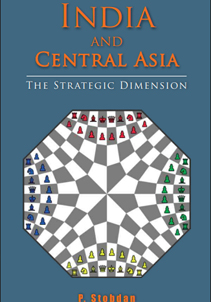India and Central Asia: The Strategic Dimension
- 2020 |
- Book

KW Publishers
About the Book
Central Asia is the northern frontier of the Islamic world hitherto unaffected by fundamentalist wave. The Soviet developmental legacy still remains as a bulwark against potential extremist threats emanating from Pakistan and Afghanistan. However, behind the secular settings a major shift to a far more religious pattern of society is underway in the region.
Over the years, India has been taking renewed interest in enhancing its strategic presence in Central Asia, but it is yet to capitalise on various opportunities and potentials. India’s full membership into the SCO now opens up an opportunity for a closer engagement with region but New Delhi still lacks a political-strategic clarity.
This book is an attempt to provide an overview of the political and strategic process at work in Central Asia since its emergence in 1991 and the intricate issues that impinge on India. The book is mostly about identifying critical points that are important for evolving a sound Central Asia policy in India.
The book does not in any sense purport to be an academic endeavour on Central Asian studies but merely a narrative, as well as, an analytical account and a result of author’s own self-education and understanding gathered through extensive interactions with wide sections of people in Kyrgyzstan and Kazakhstan, especially with the think tanks, academia, government officials and the diplomatic community. The chapters in book are capsulated to provide analyses of the impinging issues that shape the dynamic interplay between Central Asia’s internal polity and its external outlook. The book contains aspects critical for enhancing India’s strategic presence in the region.
About the Author
P. Stobdan P. Stobdan is a distinguished academician, diplomat, author and foreign policy/national security expert. He has been working for a long time on the issues relating Eurasian affairs.
Ambassador Stobdan is currently the President of the Ladakh International Centre, Leh. He regularly writes for Indian Express, The Hindu, The Tribune, Hindustan Times and other national dailies in India.
His recent book The Great Game in the Buddhist Himalayas: India and China’s Quest for Strategic Dominance is published by Penguin India in October, 2019.
Contents
Introduction
1. New Central Asia: Period of Geopolitical Transition
2. China’s Foray into Central Asia
3. America’s Strategic Tryst with Central Asia
4. Russia’s Rebound in Central Asia
5. The Rise of the Shanghai Cooperation Organisation
6. Regional Security Challenges in Central Asia
7. India-Central Asia: Reflection on Ancient Linkages
8. Rebooting the Civilisational Connect
9. Central Asian Imprints on India
10. “Great Game” – The Interrupted Period
11. Reconnecting with Central Asian States
12. India’s Security Concerns in Central Asia
13. Energy Deal: Untying the Gordian Knot
14. Enhancing Strategic Engagement
15. Strategic Focus on Kazakhstan
16. Seizing New Opportunities Trade and Business Prospects
17. Regional Connectivity and Integration
18. India and the Shanghai Cooperation Organization
19. Widening Strategic Footprints Under the SCO Framework
20. Eurasia – Region of Cooperative Rebalancing
21. Soft Power: Regaining Centrality with Modern Content
22. Meeting Future Challenges
Annexures
1. TejKadam: India–Kazakhstan Joint Statement
2. Joint Statement between Uzbekistan and India
3. Joint Statement between Turkmenistan and India
4. Joint Statement between Kyrgyzstan and India
5. Joint Statement between Tajikistan and India
6. Terrorist and Extremist Organizations Banned in SCO States
Index







